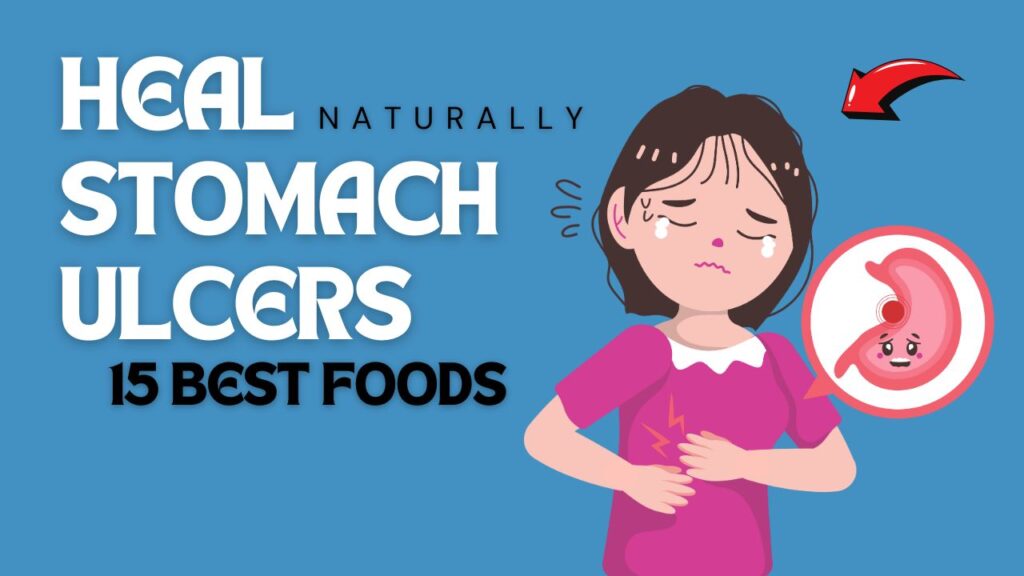Did you know that nearly 1 in 10 people worldwide will develop a stomach ulcer at some point in their life?
Ulcers are painful sores in the lining of the stomach or small intestine, often caused by Helicobacter pylori (H. pylori) infection, stress, smoking, or long-term use of NSAIDs (like ibuprofen). They can trigger burning pain, nausea, bloating, and even weight loss if not managed properly.
Here’s the good news: while medications play a vital role in healing, certain foods are nature’s own “medicine” for ulcers. In fact, some ingredients can reduce inflammation, protect the stomach lining, and speed up recovery naturally.
In this post, we’ll cover 15 powerful foods that can help heal stomach ulcers fast—with tips on how to eat them, who should enjoy them (and who shouldn’t), storage hacks, do’s & don’ts, and possible side effects to watch out for.

Table of Contents
15 Top Foods To Heal Ulcers
1. Cabbage
Cabbage is one of the most researched foods for stomach ulcers. Its juice contains glutamine and vitamin U (S-Methylmethionine), compounds proven to speed ulcer healing.
Best Ways to Eat or Use It
- Fresh cabbage juice (blend raw cabbage with a little water)
- Lightly steamed in soups or stir-fries
- Fermented as sauerkraut for probiotics
Who Should Eat / Avoid
- Good for: People with ulcers, digestive issues, or those needing a vitamin C boost
- Avoid if: You have thyroid problems (raw cabbage in excess may interfere with thyroid function)
Storage & Buying Tips
- Pick firm, heavy cabbages with crisp leaves
- Store in the fridge up to 2 weeks
- Don’t wash until ready to use (to prevent spoilage)
Do’s & Don’ts
✅ Do: Drink raw cabbage juice for best results
❌ Don’t: Overcook—it destroys healing compounds
Possible Side Effects
- May cause gas or bloating if eaten in large amounts
2. Honey
Ancient cultures used honey as a natural ulcer remedy, and modern science backs it up. Honey has antibacterial properties against H. pylori and also coats the stomach lining.
Best Ways to Eat or Use It
- A spoonful on an empty stomach
- Added to warm (not hot) herbal teas
- Drizzled over yogurt
Who Should Eat / Avoid
- Good for: Ulcer patients, those needing natural sweetness
- Avoid if: You’re diabetic (consume in moderation)
Storage & Buying Tips
- Choose raw, organic honey for maximum healing compounds
- Store in a sealed glass jar at room temperature
Do’s & Don’ts
✅ Do: Use raw honey for antibacterial benefits
❌ Don’t: Mix with very hot water (kills enzymes)
Possible Side Effects
- Can raise blood sugar if consumed excessively
3. Bananas
Bananas contain pectin and flavonoids that help neutralize stomach acid and protect the gut lining.
Best Ways to Eat or Use It
- Eat ripe bananas as a snack
- Blend into smoothies with yogurt
- Slice over oatmeal
Who Should Eat / Avoid
- Good for: People with acid reflux or ulcers
- Avoid if: You have high potassium levels (kidney issues)
Storage & Buying Tips
- Buy slightly green for longer shelf life
- Store at room temperature (not in the fridge)
Do’s & Don’ts
✅ Do: Eat ripe bananas for better digestion
❌ Don’t: Eat unripe bananas in excess (can cause constipation)
Possible Side Effects
- Overeating may cause bloating
4. Yogurt
Yogurt is rich in probiotics that fight H. pylori and restore gut balance.
Best Ways to Eat or Use It
- Plain, unsweetened yogurt daily
- Add fresh fruit or honey for flavor
- Blend into smoothies
Who Should Eat / Avoid
- Good for: Anyone with ulcers or weak digestion
- Avoid if: You’re lactose intolerant (opt for lactose-free versions)
Storage & Buying Tips
- Choose plain, unsweetened yogurt
- Keep refrigerated and consume within a week
Do’s & Don’ts
✅ Do: Pair with fruits for extra nutrients
❌ Don’t: Choose flavored yogurt (too much sugar)
Possible Side Effects
- May cause mild bloating if eaten in large amounts
5. Garlic
Garlic has antibacterial compounds (allicin) that help kill H. pylori.
Best Ways to Eat or Use It
- Raw garlic (1 clove daily)
- Added to soups, curries, or stir-fries
- Garlic-infused olive oil
Who Should Eat / Avoid
- Good for: People with infections and ulcers
- Avoid if: You’re on blood-thinning medication
Storage & Buying Tips
- Store bulbs in a cool, dry place
- Avoid refrigerated storage (causes sprouting)
Do’s & Don’ts
✅ Do: Crush garlic and let it rest 10 minutes before eating
❌ Don’t: Overcook—it reduces active compounds
Possible Side Effects
- Can cause bad breath or stomach irritation if eaten raw in large amounts
6. Green Tea
Green tea is rich in catechins, antioxidants that reduce stomach inflammation and fight ulcer-causing bacteria.
Best Ways to Eat or Use It
- Brew fresh green tea (not too strong)
- Drink warm, not boiling hot
- Can be combined with honey
Who Should Eat / Avoid
- Good for: Ulcer patients, weight-loss seekers
- Avoid if: Sensitive to caffeine
Storage & Buying Tips
- Store tea leaves in an airtight container
- Keep away from sunlight and moisture
Do’s & Don’ts
✅ Do: Drink 2–3 cups daily
❌ Don’t: Drink on an empty stomach (may cause nausea)
Possible Side Effects
- Too much may cause insomnia
7. Turmeric
Turmeric contains curcumin, a compound that reduces ulcer pain and boosts healing.
Best Ways to Eat or Use It
- Golden milk (turmeric with warm milk)
- Added to curries or soups
- Taken as a supplement (with medical advice)
Who Should Eat / Avoid
- Good for: Ulcer patients, those with inflammation
- Avoid if: You’re pregnant or have gallbladder issues
Storage & Buying Tips
- Store powder in airtight jars
- Fresh turmeric roots last longer in the fridge
Do’s & Don’ts
✅ Do: Pair with black pepper (boosts absorption)
❌ Don’t: Consume in very high doses
Possible Side Effects
- May cause stomach upset if overused
8. Almonds
Almonds are alkaline and rich in vitamin E, which soothes ulcer irritation.
Best Ways to Eat or Use It
- Soak overnight and eat in the morning
- Blend into almond milk
- Use as a snack
Who Should Eat / Avoid
- Good for: Ulcer patients, heart health, diabetics
- Avoid if: You have nut allergies
Storage & Buying Tips
- Store in airtight jars in a cool place
- Refrigerate in hot climates
Do’s & Don’ts
✅ Do: Eat soaked almonds for better digestion
❌ Don’t: Eat salted or fried almonds
Possible Side Effects
- Overeating may cause weight gain
9. Carrots
Carrots are high in beta-carotene and fiber, which protect the stomach lining.
Best Ways to Eat or Use It
- Fresh carrot juice
- Raw with hummus
- Cooked in soups or stews
Who Should Eat / Avoid
- Good for: Ulcer patients, eye health
- Avoid if: Rare carrot allergy (very uncommon)
Storage & Buying Tips
- Store in the fridge, in a perforated bag
- Avoid storing near apples (releases ethylene gas)
Do’s & Don’ts
✅ Do: Eat raw for maximum vitamin content
❌ Don’t: Overcook (destroys vitamins)
Possible Side Effects
- Eating too much may cause skin to turn orange (harmless)
10. Olive Oil
Olive oil has polyphenols that fight H. pylori bacteria and reduce inflammation.
Best Ways to Eat or Use It
- Drizzle over salads
- Add to soups
- Use as a cooking oil (low heat)
Who Should Eat / Avoid
- Good for: Ulcer patients, heart health
- Avoid if: Consumed in excess (high in calories)
Storage & Buying Tips
- Buy extra virgin olive oil
- Store in a dark glass bottle away from heat
Do’s & Don’ts
✅ Do: Use cold for best nutrients
❌ Don’t: Overheat olive oil
Possible Side Effects
- May cause mild diarrhea if consumed in large amounts
11. Ginger
Ginger has been used in traditional medicine for centuries to relieve digestive issues. It contains gingerol and shogaol, compounds with powerful anti-inflammatory and antibacterial effects that can ease ulcer pain and speed healing.
Best Ways to Eat or Use It
- Fresh ginger tea (steep slices in warm water)
- Add grated ginger to soups, stir-fries, or curries
- Blend small amounts into smoothies
Who Should Eat / Avoid
- Good for: Ulcer patients, people with indigestion, nausea, or morning sickness
- Avoid if: You’re on blood-thinning medications or prone to acid reflux (too much ginger can worsen it)
Storage & Buying Tips
- Buy firm, smooth ginger roots
- Store in the fridge wrapped in paper towels or freeze for long-term use
Do’s & Don’ts
✅ Do: Use fresh ginger for the most benefits
❌ Don’t: Overconsume powdered ginger—it’s more concentrated
Possible Side Effects
- Large amounts may cause heartburn or diarrhea
12. Apples
“An apple a day keeps the doctor away” isn’t just a saying—it holds true for ulcers too. Apples are rich in flavonoids and soluble fiber (pectin), which coat the stomach lining, reduce acid irritation, and encourage healing.
Best Ways to Eat or Use It
- Eat raw apples with the peel (extra fiber)
- Bake or stew apples for a soothing dessert
- Slice into oatmeal or yogurt bowls
Who Should Eat / Avoid
- Good for: Ulcer patients, people with constipation, heart health
- Avoid if: You have fructose intolerance or IBS (can trigger bloating)
Storage & Buying Tips
- Choose firm apples without soft spots
- Store in a cool, dark place or refrigerate
- Keep separate from vegetables (apples release ethylene gas)
Do’s & Don’ts
✅ Do: Eat apples with skin for maximum nutrients
❌ Don’t: Overdo apple juice—it’s high in sugar
Possible Side Effects
- Excess apple consumption may cause mild bloating
13. Oatmeal
Oatmeal is a gentle, soothing food for ulcers. It’s high in soluble fiber (beta-glucan) that forms a protective coating in the stomach and reduces acid irritation.
Best Ways to Eat or Use It
- Cooked oatmeal porridge with bananas or honey
- Overnight oats soaked in yogurt or milk
- Add ground oats to smoothies for thickness
Who Should Eat / Avoid
- Good for: Ulcer patients, diabetics, people with cholesterol issues
- Avoid if: You’re sensitive to gluten (choose certified gluten-free oats)
Storage & Buying Tips
- Buy rolled oats or steel-cut oats (less processed)
- Store in airtight containers in a cool, dry place
Do’s & Don’ts
✅ Do: Cook oats with water or milk for better digestion
❌ Don’t: Add too much sugar or processed toppings
Possible Side Effects
- Rarely, oats may cause bloating or gas if you’re not used to high fiber
14. Flaxseeds
Flaxseeds are rich in mucilage (a gel-like substance) that coats the stomach lining, reducing irritation and promoting ulcer healing. They also provide omega-3 fatty acids and fiber for overall gut health.
Best Ways to Eat or Use It
- Add ground flaxseeds to smoothies, oatmeal, or yogurt
- Sprinkle over salads or soups
- Mix with warm water to form a soothing drink
Who Should Eat / Avoid
- Good for: Ulcer patients, heart health, constipation relief
- Avoid if: You have bowel obstruction or hormone-sensitive conditions (flax contains phytoestrogens)
Storage & Buying Tips
- Buy whole flaxseeds and grind fresh for best nutrients
- Store in airtight containers in the fridge (prevents rancidity)
Do’s & Don’ts
✅ Do: Grind flaxseeds before eating (whole seeds pass undigested)
❌ Don’t: Store ground flaxseeds at room temperature (they spoil quickly)
Possible Side Effects
- Eating too much may cause diarrhea
15. Chamomile Tea
Chamomile is famous for its calming effects, but did you know it also helps with ulcers? Its anti-inflammatory and mild antibacterial compounds relax the digestive tract, reduce acid, and support healing.
Best Ways to Eat or Use It
- Brew chamomile flowers into tea
- Drink warm before bedtime for relaxation
- Combine with honey for added healing effects
Who Should Eat / Avoid
- Good for: Ulcer patients, people with stress-related digestive issues, insomnia
- Avoid if: You’re allergic to ragweed, daisies, or chrysanthemums
Storage & Buying Tips
- Store dried chamomile in airtight containers away from sunlight
- Use within 6 months for freshness
Do’s & Don’ts
✅ Do: Drink a cup before bedtime for digestive comfort
❌ Don’t: Consume in large doses (may cause drowsiness)
Possible Side Effects
- Rare allergic reactions in sensitive individuals
Conclusion
Stomach ulcers may feel like a constant battle, but the right foods can make healing faster, reduce discomfort, and prevent flare-ups.
From cabbage juice and honey to soothing remedies like oatmeal, flaxseeds, and chamomile tea, nature offers plenty of powerful options.
The key is consistency—incorporating these foods daily, in simple forms like juices, teas, porridges, and snacks, can transform your gut health over time.
Healing doesn’t have to come from a pill bottle alone. With small, smart choices on your plate, you can rebuild your stomach lining, fight off harmful bacteria, and enjoy meals without pain.
Now it’s your turn: Which of these healing foods have you tried for stomach relief? Share your go-to recipe or remedy in the comments below!
Frequently Asked Questions (FAQs)
What foods help heal stomach ulcers quickly?
Foods like cabbage, honey, yogurt, bananas, turmeric, and chamomile tea are known to soothe the stomach lining, fight infection, and speed up ulcer healing.
Can stomach ulcers go away with diet alone?
Mild ulcers may improve with a healing diet, but most ulcers require medical treatment. The right foods can help reduce symptoms and speed recovery, but always consult a doctor.
Which foods should I avoid if I have a stomach ulcer?
Avoid spicy foods, fried foods, processed snacks, caffeine, alcohol, and acidic foods like citrus and tomatoes, as they can irritate the ulcer.
Is milk good for stomach ulcers?
Milk may temporarily soothe ulcer pain, but it can also trigger more acid production later. Instead, choose yogurt or plant-based alternatives for better long-term relief.
Can honey cure ulcers completely?
Honey has antibacterial properties against H. pylori, the bacteria linked to ulcers. While it helps in healing, it’s not a standalone cure—combine it with a healthy diet and medical treatment.
How long does it take for stomach ulcers to heal with food?
With proper treatment and a supportive diet, ulcers may heal in 4–8 weeks. Healing time depends on severity, lifestyle, and consistency in following dietary changes.
Is coffee bad for stomach ulcers?
Yes, coffee (even decaf) can irritate the stomach lining and increase acid production, making ulcer symptoms worse. Herbal teas like chamomile are better alternatives.
Are bananas good for stomach ulcers?
Yes, bananas coat the stomach lining, reduce acid irritation, and provide natural soothing effects, making them one of the best fruits for ulcers.
Can stress make stomach ulcers worse?
Stress doesn’t directly cause ulcers, but it can worsen symptoms and slow healing. Relaxation techniques and calming foods like chamomile tea can help.
Do probiotics help with stomach ulcers?
Yes, probiotics in yogurt and fermented foods help restore gut balance, fight H. pylori, and support ulcer healing.










